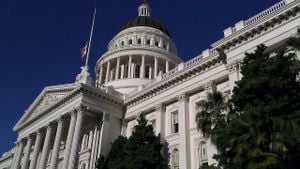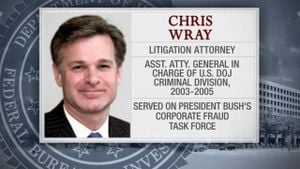President-elect Donald Trump has nominated billionaire Howard Lutnick to serve as the next Secretary of Commerce, emphasizing his dedication to leading the administration's tariff and trade policies. Lutnick, widely recognized as the co-chair of Trump's transition team and the head of the financial services firm Cantor Fitzgerald, expressed his gratitude to Trump for the opportunity to help 'Make America Great Again' and vowed to tap the nation’s full economic potential.
Trump, who announced the nomination on social media, declared, 'He will lead our Tariff and Trade agenda, with additional direct responsibility for the Office of the United States Trade Representative.' Lutnick's role will be pivotal as the Commerce Department oversees various aspects of economic policy, including the implementation of tariffs Trump promised during his campaign to protect American industries.
The nomination drew attention to Lutnick's previous experience and his deep ties to Wall Street. Having spent over three decades at Cantor Fitzgerald, Lutnick is respected within financial circles, yet his forthcoming role as Commerce Secretary will be his first foray directly influencing government policy. Lutnick had previously been considered for the Treasury Secretary position but shifted to the Commerce portfolio amid competitive intra-team dynamics and patronage among prominent Republican financiers.
His nomination also becomes part of Trump’s broader strategy to appoint individuals with significant private sector experience, reflecting Trump's business-centric approach to governance. Trump’s administration indicates it will stay committed to its protectionist agenda, featuring tariffs considered instrumental to American workers' interests.
Notably, Lutnick has positioned tariffs as 'incredibly useful tools' for the Trump administration, underlining their necessity to 'protect the American worker.' His stance resonates with Trump's vision of nurturing domestic industries against foreign competition, particularly with China, which has been targeted with extensive proposed tariffs, ranging from 10 to 20 percent on imports, and up to 60 percent on goods from its eastern rival.
The potential ramifications of Lutnick's commerce leadership point to toughened stances on international trade. Research from the Peterson Institute for International Economics warned the proposed tariff structures could impose significant financial burdens on American households, potentially costing them over $2,600 annually due to increased prices on imported goods. Nevertheless, Lutnick and Trump advocate tariffs as central to the 'America First' architecture, aimed at reshaping global trade balances.
With Lutnick's wealth and connections, he is anticipated to bridge the gap between the current administration and corporate leaders—a necessity for fostering business growth under the federal umbrella. Industry insiders comprehend his role will involve managing initiatives tied to technology, the automotive sector, and energy production, which have been contentious under both the Trump and Harris administrations.
Undercutting the previous administration’s policies, Lutnick is seen as a proponent of deregulation and increased energy production, particularly as Trump has pledged to revive the U.S. economy by relaxing existing regulations. Lutnick's history with Cantor Fitzgerald includes the monumental task of restoring company operations after the tragic events of September 11, 2001, when the firm's headquarters were compromised, leading to considerable loss of life among employees.
Lutnick's resilience following the tragedy—having lost his brother on 9/11—etched his reputation within both the financial and wider communities as not just a leader but as someone who cares about restoring hope and rebuilding in the aftermath of adversity.
Senator Cynthia Lummis remarked on Lutnick’s success against inherent challenges, asserting, 'He has been outrageously successful under the most adverse circumstances.' The senator believes Lutnick's confirmation will be smooth based on his track record of leadership and commitment to rebuilding the company post-9/11.
Confirmed or not, Lutnick’s association with Trump raises questions as to how he will balance his roles amid the multifaceted agenda the administration promises to push forward. His position involves guiding oversight across numerous departments, including the National Oceanic and Atmospheric Administration and the Census Bureau—agencies fundamental to both economic measurement and climate policy.
While Lutnick's exact influence on international negotiations remains uncertain, his past prowess at tackling complex crises will become instrumental as he faces the challenges of trade balances and international relations. With Trump likely to leverage Lutnick's experiences to negotiate favorable terms with U.S. trading partners, the department's future under his watch could solidify the rising tensions seen during the previous administration.
The nomination has also drawn the attention of critics concerned about the potential conflicts of interest between Lutnick's private business interests and public responsibilities. Nonetheless, the nature of Lutnick’s contributions as Commerce Secretary will likely be characterized by his approach to cutting regulations and advocating for policies supporting economic growth and iteration, aiming to position the U.S. as more competitive on the world stage.
At the recent Madison Square Garden rally, Lutnick reinforced his commitment to Trump’s economic vision, stating how the U.S. had long been sidelined by international competitors. Declaring, 'It is time to Make America Great Again,' he aligned his views with Trump’s strategy for invigorated American commerce.
Going forward, Lutnick, supported by several high-profile backers like Elon Musk, is anticipated to install key policies as the administration unveils its comprehensive economic agenda. His statement on the need for financial accountability reflects the administration's broader aim to overhaul expenditure, especially pertaining to what they classify as wasteful government spending.
While Lutnick’s confirmation hinges on the Senate's approval, many believe his background, combined with his loyalty to Trump, positions him as someone who will pursue the administration's ambitious directives without hesitation. The Commerce Department will soon spearhead efforts aimed directly at reshaping trade policy alongside existing domestic agendas, ensuring Lutnick’s mark on both the private and public sectors is indelibly linked to the upcoming administration's performance.



